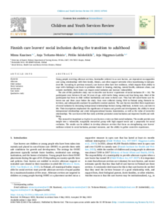Abstract
Young people receiving aftercare services, hereinafter referred to as care leavers, are dependent on supportive and caring relationships with their family, friends, and other support networks when transitioning to independent life. According to previous research, care leavers often have low resilience, which impairs their ability to cope with challenges and leads to problems related to housing, studying, mental health, substance abuse, and somatic morbidity; these issues can impair social inclusion and increase vulnerability.
The aim of this qualitative study was to describe care leavers’ experiences of social inclusion (N = 16). The participants were between 18 and 20 years of age, with twelve being women and four being men. Most of the participants had been in child welfare institutions and some in foster care. They had left out-of-home care between one and three years before the study. Data were collected during 2016 in Finland using thematic interviews, and subsequently analysed by qualitative content analysis. The care leavers described their experiences of social inclusion by discussing interpersonal relationships formed during childhood, in foster care, and later in life. Their descriptions emphasised the significance of trauma and growth and development, the ability to mend interpersonal relationships and avoid intergenerational trauma transmission, as well as the value of corrective relationships. The care leavers felt that daily activities promoted social inclusion and improved health and wellbeing. This research is important as it gives to care leavers a voice on their social inclusion. The results provide new insight into a vulnerable, marginally researched group with high support needs and a propensity for social exclusion. The results can be utilised to develop aftercare services that focus on strengthening care leavers’ resilience related to social inclusion, personal resources, and the ability to gather corrective experiences.

